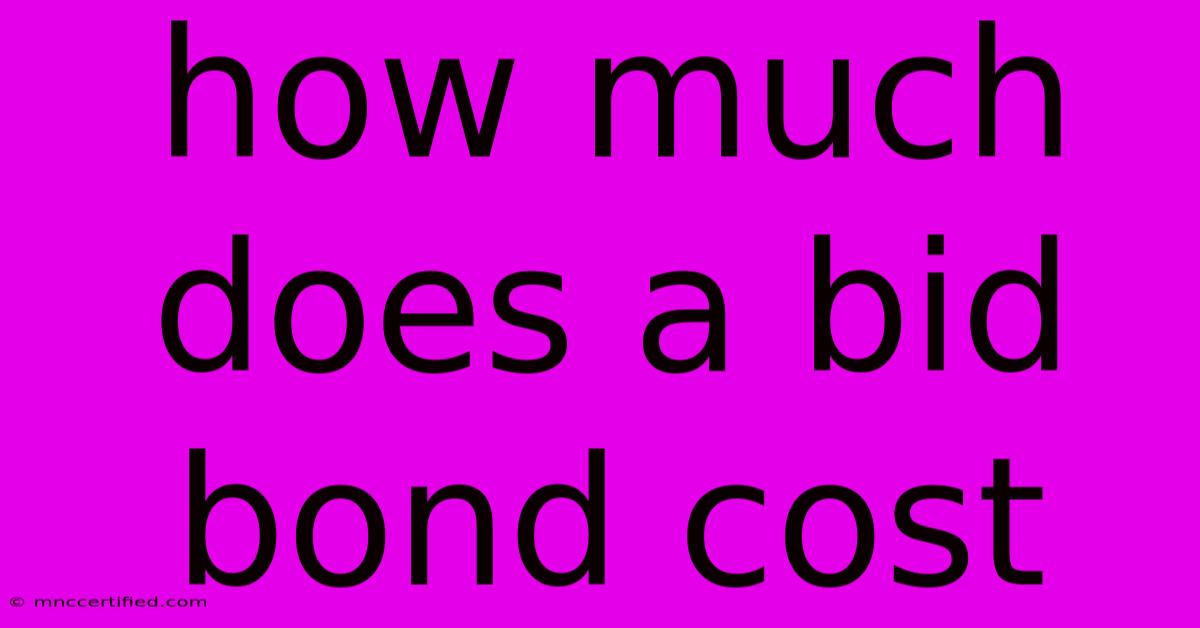How Much Does A Bid Bond Cost

Table of Contents
How Much Does a Bid Bond Cost? A Comprehensive Guide
Bidding on large-scale projects, whether public works or private contracts, often requires a bid bond. This crucial document assures the project owner that the bidder is serious and financially capable of undertaking the project if awarded the contract. But a common question arises: how much does a bid bond cost? The answer, unfortunately, isn't a simple number. The cost depends on several factors, making it vital to understand the intricacies before you commit.
Factors Influencing Bid Bond Costs
Several variables determine the premium you'll pay for a bid bond. These factors interact to create a unique cost for each situation.
1. The Bid Bond Amount
The most significant factor is the bid bond amount. This is a percentage of the total bid price, typically ranging from 5% to 10%, although it can vary depending on the project and the issuing institution. A higher bid amount directly translates to a higher bid bond cost. The higher the bid, the higher the premium.
2. The Bid Bond Percentage
The percentage of the bid amount required for the bond also plays a crucial role. A 5% bid bond on a $1 million project will be considerably cheaper than a 10% bond for the same project. This percentage is often determined by the project owner or the relevant governing body. Understanding the required percentage is key to accurate cost estimation.
3. Your Creditworthiness
Your credit history significantly impacts the cost. Applicants with excellent credit scores typically receive lower premiums. Insurers assess the risk involved in issuing a bond, and a strong credit profile signifies lower risk, resulting in lower premiums and potentially more favorable terms.
4. The Project Type and Location
The nature of the project and its location can influence the cost. High-risk projects, complex undertakings, or those in regions with a history of financial instability may command higher premiums. Geographical location and project complexity contribute to risk assessment.
5. The Surety Provider
Different surety companies have different pricing structures. Shopping around and comparing quotes from multiple providers is essential to secure the most competitive rate. Don't settle for the first quote; compare options for the best deal. Consider their reputation, financial strength, and client testimonials before making a decision.
6. The Duration of the Bond
While typically short-term, the duration of the bid bond influences the cost. The longer the bond is needed, the higher the premium might be. Clarify the required duration with the project owner.
Estimating Bid Bond Costs: A Practical Approach
While a precise cost calculation requires a quote from a surety provider, you can get a rough estimate. Assume a typical range of 0.5% to 1% of the total bid amount as a starting point. This is a broad estimate, and the actual cost can vary significantly based on the factors discussed above.
For example:
- $1 million bid with a 5% bond requirement: The bond amount would be $50,000. The premium might range from $500 to $1000 (0.5% to 1% of the bond amount).
- $5 million bid with a 10% bond requirement: The bond amount is $500,000. The premium could fall between $2500 and $5000 (0.5% to 1% of the bond amount).
Remember: these are just rough estimates. Always obtain multiple quotes from reputable surety providers to determine the actual cost.
Finding the Right Surety Provider
Selecting the right surety provider is crucial. Look for companies with:
- Strong financial ratings: Check ratings from agencies like A.M. Best.
- Experience in your industry: Experience in your specific field ensures better understanding of your needs.
- Excellent customer service: A responsive and helpful provider can make the process smoother.
Conclusion: Understanding Bid Bond Costs is Key
The cost of a bid bond is not fixed; it's dynamic and contingent on several factors. By understanding these influences and diligently comparing quotes from various surety providers, you can secure the best possible terms and confidently pursue lucrative project opportunities. Remember, proactive research and due diligence will significantly impact your overall bidding strategy and success.

Thank you for visiting our website wich cover about How Much Does A Bid Bond Cost. We hope the information provided has been useful to you. Feel free to contact us if you have any questions or need further assistance. See you next time and dont miss to bookmark.
Featured Posts
-
Nz Vs England Toss Bowling Choice
Nov 28, 2024
-
Bleecker Street De Bond No 9
Nov 28, 2024
-
21 000 Affected Portsmouth Millwall Postponement
Nov 28, 2024
-
Celtic Quickfire Crisis Meeting
Nov 28, 2024
-
Real Madrid Lineup Mbappe Starts Vs Liverpool
Nov 28, 2024